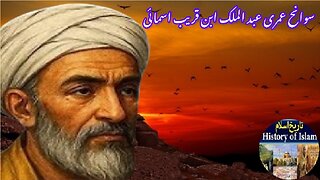Premium Only Content

Adam & Eve in Islam, A Divine Beginning from One Soul اسلام میں آدم اور حوا، ایک روح سے الہی آغاز
@islamichistory813 #healing #and #events #from #the #quran #historical #stories #and #events #quranicstories #selfhealing #success #stories #striking #events #in #history #quranstories, #storiesfromthequran #religious #creation #stories #trending #quran #short #historical #loves #historical #heroes #what #is #true #strength #calm #quran #recitation #for #babies #islamic #healing
Adam & Eve in Islam: A Divine Beginning from One Soul
Brothers, sisters, friends and elders Assalamu Alaikum, wa Rahmatullahi wa Barakatuhu, we are presenting the 75th episode of the Islamic informative video based on healing and events from the Holy Quran, and in this video we will describe,Adam & Eve in Islam: A Divine Beginning from One Soul
The Qur’an in Surah An-Nisa (4:1) begins with a profound and foundational truth about human origin: “O mankind, fear your Lord, who created you from one soul and created from it its mate and dispersed from both of them many men and women…” This verse encapsulates the Islamic view of human creation, emphasizing that all of humanity originates from a single soul—referring to Adam (?dam)—and from him, Allah created his mate, Hawwa (Eve). This simple yet deeply meaningful description lays the groundwork for several core principles in Islamic theology and ethics, including the unity of humankind, the equality of the sexes, and the sanctity of human relationships. The verse is not merely a statement about biological origin; it is a divine reminder of our shared beginnings, our responsibilities toward one another, and our duty to live with consciousness of God (taqwa).
By stating that all humans are created from one soul, the Qur’an reinforces the idea of human equality. Regardless of race, ethnicity, status, or geography, every person traces their origin back to the same source. This concept undermines all forms of arrogance, racism, and tribal superiority, which were deeply entrenched in pre-Islamic societies and, sadly, persist to this day. The unity of origin calls for the unity of purpose—humanity is meant to live together in mutual respect, empathy, and cooperation. This foundational message dismantles any notion of inherent superiority and invites all people to recognize their shared identity as part of the human family.
The verse continues by stating that from this soul, Allah created its mate. Islamic tradition holds that Hawwa (Eve) was created from Adam—not to imply inferiority, but to symbolize intimacy, partnership, and mutual support. The term “mate” (*zawj*) in Arabic signifies not only a biological partner but also a companion and complement. This relationship forms the basis of the institution of marriage in Islam, which is built on harmony, love, and tranquility. Far from portraying woman as a derivative or lesser being, the Qur’anic framing emphasizes that both man and woman were created by Allah’s will, for one another, and as equal parts of a whole. They share the same essence, dignity, and spiritual responsibility.
This pairing also highlights the importance of family as the cornerstone of society. From Adam and Hawwa came “many men and women,” symbolizing the natural progression of human life through marriage and procreation. Islam views the family unit as a sacred institution, one that nurtures individuals and stabilizes communities. The familial relationship is not a mere social contract but a divinely ordained bond that reflects the mercy and wisdom of the Creator. This lineage, rooted in divine creation, underscores that every life is sacred and should be treated with honor, justice, and compassion.
Moreover, the verse begins with the command: “O mankind, fear your Lord…” This call to consciousness of God (taqwa) serves as the moral foundation for all human behavior. It connects our shared origin with our shared moral obligations. If we all come from the same soul, then our treatment of one another must reflect that reality. We cannot claim superiority over others, nor can we mistreat them without violating the very essence of our own creation. Taqwa becomes the lens through which human relationships are purified and elevated—from personal interactions to social policies.
The verse also has significant implications for gender relations. By stating that both man and woman were created from the same soul, the Qur’an elevates the status of women in a time when they were often degraded or viewed as property. It affirms their equal role in the spiritual and moral framework of life. Both are accountable before Allah, both are capable of righteousness, and both are partners in building a just society. The verse subtly but powerfully challenges patriarchal norms and encourages a balanced view of gender rooted in divine justice.
Furthermore, the reference to Adam and Hawwa at the beginning of Surah An-Nisa (literally “The Women”) is especially fitting. The chapter goes on to detail various laws and principles related to family, inheritance, women’s rights, and justice. Beginning with the story of our creation reminds the reader that these laws are not arbitrary; they stem from a deep understanding of human nature and divine wisdom. The reminder of our shared origin sets the tone for ethical relationships, urging believers to approach one another with humility, kindness, and a sense of shared destiny.
In conclusion, Qur’an 4:1 provides a profound reflection on the origin of humanity through the creation of Adam and his mate, Hawwa. It emphasizes the unity, equality, and sanctity of all human beings, urging mankind to live with God-consciousness and mutual respect. From a single soul, Allah created not only a mate but the foundation for human society, based on compassion, cooperation, and justice. This verse is not only a statement of creation—it is a timeless reminder of who we are, where we come from, and how we are meant to live together on this Earth under the guidance of our Creator.
With this, we ask for your permission until tomorrow and pray to Allah Almighty to grant us the ability to act on the Quran and Hadith, Amen
Allah Hafiz
============================
-
 6:31
6:31
ISLAMIC HISTORY
1 hour agoBiography of Abd al-Malik Ibn Qarib Isma'i سوانح حیات عبد الملک ابن قریب اسمائی
1 -
 2:11:49
2:11:49
Steven Crowder
4 hours agoThe Lies are Sick: Charlie Kirk's Legacy Separating Fact from Fiction
407K285 -
 LIVE
LIVE
Sean Unpaved
1 hour agoMNF Mayhem: Bucs' Stunner, Brady's Booth Drama, Shedeur's Draft Doge & the Masters on Prime
123 watching -
 1:07:59
1:07:59
NotTheBee
1 day agoOur Memories Of Charlie Kirk And What This Means For The Country
57.2K24 -
 1:19:51
1:19:51
The Rubin Report
3 hours agoListen to the Fear in Whoopi Goldberg’s Voice on 'The View' as She Gives a Chilling Warning
62.2K68 -
 LIVE
LIVE
Rebel News
1 hour agoLibs blame Poilievre, Cons call to scrap TFW program, Carney on Canada-US relations | Rebel Roundup
307 watching -
 LIVE
LIVE
The Mel K Show
2 hours agoMORNINGS WITH MEL K - Constitution Incompatible with Globalist Goals 9-16-25
740 watching -
 35:35
35:35
Grant Stinchfield
2 hours ago $0.65 earnedRFK Jr. Speaks Out: The Pain of Assassination & the Loss of Charlie Kirk
13.4K2 -
 1:59:33
1:59:33
Benny Johnson
3 hours agoKash Patel Testifying LIVE Now on Charlie Kirk Assassination, Trump to Declare Antifa TERRORISTS?!
97.6K71 -
 2:07:38
2:07:38
Timcast
4 hours ago🚨LIVE: Kash Patel Testifies Over Charlie Kirk Assassination In Senate | Tim Pool
105K72